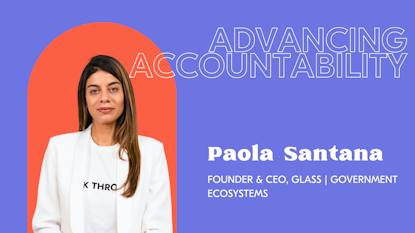2022 Open Contracting Champion: Paola Santana

For your fellow open contracting champions out there—what is the #1 piece of advice you would share with a reformer working to increase accountability, transparency, or participation in government?
To dare to do things differently. To take the first step into trying new approaches, to strike uncommon partnerships, and to massively leverage the use of technology to accelerate trial and error of policy implementation. We spend too much time perfecting long-term plans that would highly benefit from short-term execution and validation, and technology is a great ally for that. By enabling the rapid prototyping of innovative procurement platforms and solutions that contribute to citizen engagement, allowing frictionless participation by the small business community, and simplifying transaction visualization, we can maximize public procurement’s impact, today.
This year we had a nomination process for the first time. Who would YOU nominate for this Advancing Accountability champions campaign? Who do you look up to?
Elena Gil Valentín, Procurement Director at Aena – Former Deputy Director of Contracting, Investments, and Purchasing at State Post and Telegraph Society, Spain. She has over 12 years of experience in investments and public procurement. During her time at the State Post and Telegraph Society, a state society that manages more than 500 million in spending and investment, she promoted innovation and digital transformation in all processes related to public procurement and contracting. She implemented digital public procurement, digital invoicing, an offer evaluation project through AI and blockchain, and digital tools for contractual incident management in contract monitoring.
Elena understands that governments’ digital transformation is not only a “good initiative”, but rather an overarching obligation to reengineer value from the public sphere.
You can find Elena on LinkedIn, and also check out State Post and Telegraph Society’s website.
Transparency and accountability are just the means to an end. In your work, what are the most important end goals? How can reducing corruption risk create better social, economic, or environmental outcomes?
Our end goal is to streamline every single government transaction. Making processes more efficient, simple, and straightforward saves hundreds of hours in procurement operations and enables buyers to make high-quality complex decisions on where to invest our public budgets, and who to impact with those purchases. We identified small purchases as a fragmented, manual, and time-consuming procurement category that allowed us to showcase faster results, helping maximize value for taxpayers’ money, increasing the quality of products and services acquired by our government partners, expanding their pool of compliant vendors, and most importantly, bringing 400 million small businesses, the foundation of our countries’ economies, to the government market. Considering governments are the largest purchasers in the world (~$14 trillion globally), we believe that by dramatically reducing the barriers to entry of SMBs to government purchases, we’re opening up a new layer of the economy for everyone, and redefining the rules of doing business with governments. This means more players, more diversity, and more financial opportunities for everyone, and not only for the traditional few. That’s our actionable way of reducing corruption and creating a society where all people have real possibilities to thrive.
If public procurement was an animal, which one do you think it would be and why?
What an insightful question! Bees. Some studies have determined that bees are one of the most important animals in the world, but do not get all the credit they deserve for their part in sustaining the planet. One-third of the world’s food production depends on bees, directly contributing to people’s food security. Like bees, we believe public procurement is one of the most significant links in the public sector, impacting the quality and availability of goods and services that should be universally accessible to every individual in their daily lives. One public road blocked, a public hospital without emergency supplies, or a lack of identification cards for newborns, will impact someone’s ability to go to work or to receive immediate healthcare treatment. And one person’s challenge becomes everyone’s challenge…what seems like a little thing turns out to be a massive, systemic problem. That’s procurement’s impact, and we know that even though the general public is mostly unaware of its potential to transform government operations and results globally, we can showcase its groundbreaking outcomes by showcasing data, maximized budgets, and larger numbers of vendors doing business for the first time ever, with governments.
Find Paola and her company, Glass, on Twitter, LinkedIn, Instagram, and Facebook.